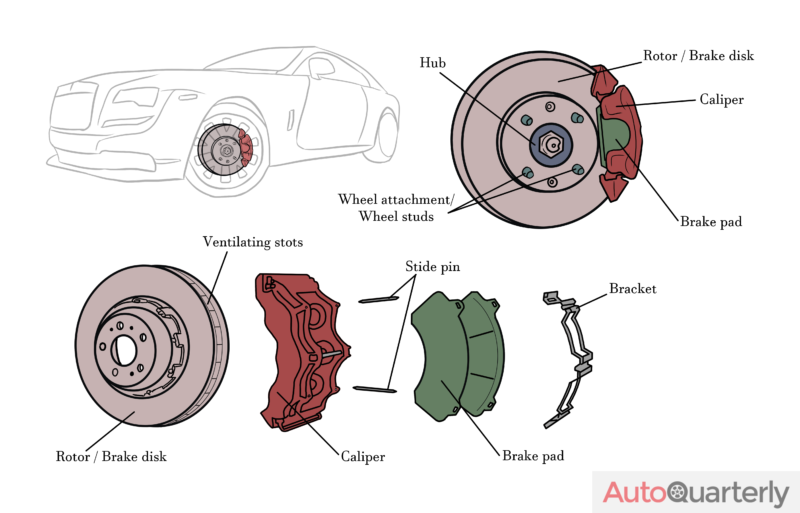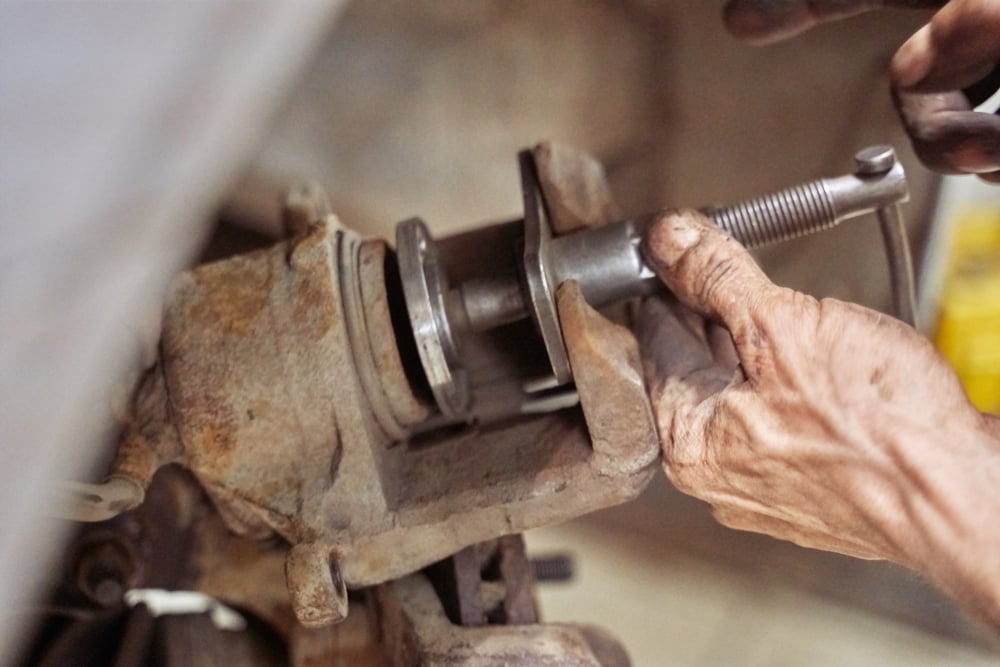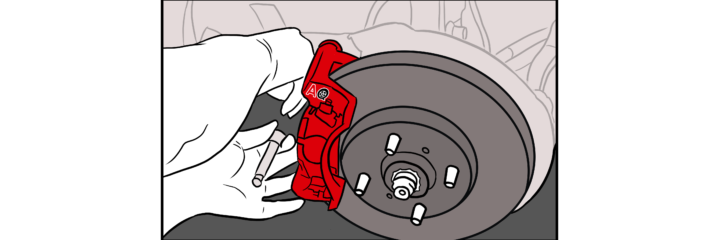Does your car give off an otherworldly screech when you stomp on the brake pedal? You know, the one where everyone in the parking lot stops what they’re doing and looks for the impending apocalypse. Yes?
Maybe you’ve noticed your car pulling to one side while driving on the highway as if it’s magically trying to steer itself? Although this may give you a good arm workout, it’s something to be worried about because it could signal a brake caliper sticking.
So, before you drive any further, let’s put on our doctor (or should that be mechanic) coats and figure out what’s wrong.
How Do Brake Calipers Work?
To understand the symptoms of sticking brake calipers, let’s quickly explore how brake calipers work.

Car wheels have four main parts:
- Tire
- Rim
- Rotor (or disc)
- Brake calipers
The tire fits onto the rim. This forms the wheel that then bolts onto the rotor. So, when you drive, the rotor turns the wheel. And when you want to stop, the brake calipers grip the rotor to slow your car down.
A simple example to understand how this works is to compare this process to catching a frisbee. Picture your hand as the calipers. As the frisbee turns and you grip onto it, your hand slows the frisbee down.
Now, what happens when you don’t catch the frisbee? It keeps on flying through the air and is likely to end up smashing a window or hitting someone. Likewise, faulty calipers can cause damage or injury, so let’s get to diagnosing the problem.
Symptoms of Stuck Brake Calipers
To fix brake caliper issues, you’ll first have to confirm that it is actually the calipers causing the problem. Luckily, there are a few dead giveaways that your brake calipers are to blame.
The Brakes Feel On
This one’s simple. If it sometimes feels like you’re driving around with the handbrake on, there’s a good chance that you have a stuck caliper. In this case, your brakes will feel engaged without you being anywhere near the pedal.
Because of this, your car will slow itself down and feel as if it’s low on performance. Also, because of the unintended braking, your fuel economy will suffer.
Your Car Pulls to the Side
If a brake caliper on one wheel is stuck closed, it will make that wheel turn slower than the others. When this happens, your car will pull to the side where the caliper is stuck.
When one of the calipers on the front wheels is stuck open, your car will pull heavily to one side when you brake. This happens because only one of the front brakes is working.
You can appreciate how this can affect your car’s handling and can be dangerous when you need to brake in an emergency. When this happens, you must fix the caliper immediately to keep you and your passengers safe.
Brake Fluid Leakage
Your car’s brake system depends on hydraulic pressure to operate effectively. This means it relies on fluid pressure to either open or close the calipers. It also means that your braking will be affected if there’s not enough braking fluid in the system.
When there’s not enough pressure, you’ll notice that your brake pedal stays down after you’ve taken your foot off it. It will come back up eventually, but it will take some time because there’s less fluid forcing the calipers open.
Another thing you’ll notice is that your car will be harder to stop. Because there’s less pressure, the brake system will react slower to your inputs and cause the calipers to close slower.
An easy way to confirm if you have a fluid leak is to check for fluid under your vehicle and around your wheels after driving.
A Burning Smell
As with any form of friction, your brakes generate heat when the calipers close on the rotor. Generally, this is nothing to worry about because they were designed to do this.
The problem is when one caliper stays shut on the rotor. This generates excess heat that can melt brake pads and even start a fire.
Thus, if you notice heat coming from your wheels or smell burning, it could be that your brake calipers are sticking.
When you have any of these symptoms, you likely have a brake caliper sticking. To confirm this, it’s always better to take your car to a qualified auto technician that has the skills and experience to pinpoint the issue.
High-Pitched Sounds
When your brake calipers are stuck, they grind against the rotors. This causes a high pitched sound when you press on the brake pedal. Often there will be fine dust between the brake pad and the rotor that’ll make this sound even worse.
When it gets bad and the pad and rotor press against each other the entire time, you’ll hear this sound even when you’re not pressing on the brake.
The Causes and Solutions for Brake Caliper Sticking
Now that you know the symptoms and probably have a good idea if you have a stuck brake caliper, we’ll look at what commonly causes it and how to fix them.
A Faulty Brake Caliper Piston
This is often the most common cause for brake calipers sticking. The piston causes the calipers to open and close or press and release on the rotor when you step on the brake pedal.
The Different Types of Piston
These pistons can be made from plastic, steel, or aluminum, which all have their pros and cons. For instance, aluminum is light but gets too hot, while steel is strong but corrodes easier.
Being made of metal, when these pistons corrode, they can’t move as freely as they should and, over time, can cause the calipers to stick. The pistons also have rubber boots that keep them lubricated. These can tear or crack, letting dirt and dust into the pistons that cause caliper sticking over time.
Solving a Piston Problem
If the piston is the culprit, you have two options for fixing the problem. You can rebuild the piston by removing it from the caliper, taking it apart, cleaning it, and replacing all the seals.
The other option is to buy and fit a new piston. Depending on the state of the caliper, this may be a viable option. In other words, if the caliper itself is in a sorry state and needs to be replaced, this may not be worth your while.
Bad Brake Hoses
As we’ve said, the entire brake system relies on hydraulic pressure to operate. For this to work, brake hoses carry fluids to and from the system.
Over time these hoses wear out, become brittle and crack, which causes leaks. As fluid leaks out of the system, there is less that remains available for effective braking, which then causes the calipers to stick.
Unlike the other parts of the caliper, there’s not much choice when it comes to fixing bad hoses. The only option is to replace them. Luckily, they’re not too expensive, and it’s an easy fix.
Corroded Caliper Slides
Each brake caliper has slides that secure the brake pads in place and allow the pads to slide inwards when you press on the brake.
Over time these slides can become corroded or gather debris that prevents the brake pads from sliding back into place. This causes the caliper to stick by keeping the pad against the rotor.
When it comes to fixing this problem, you also have options. Your first option is to rebuild the caliper, or you can buy an entirely new caliper.
Dry Caliper Bolts
The caliper bolts also have slides that need lubrication to work effectively. Because of this, they have rubber boots that keep the grease in and, as with all rubber, these boots can dry out, crack, or tear.
When this happens, the lubrication leaks out, and dust and debris get in, so the bolts don’t slide as they should. In extreme cases, this can cause a brake caliper to stick.
To fix it, you’ll be able to take the bolts out, clean them, and replace the rubber boots. You could also buy new bolts, but if they’re not available, the only option would be to replace the caliper. Obviously, and more serious is that these bolts can also break when overtightening, which would then need immediate replacement.
What Does It Cost to Fix a Stuck Caliper?
Now you want to know what this will cost you? Well, there’s no hard and fast answer here, and it depends on the state of the caliper and what you’re going to do to fix it.

Rebuilding the Existing Caliper
The cheapest option is to rebuild the caliper. As a bonus, you can do it yourself at home. During this process, you remove the caliper from the car and take it apart. You’ll then replace all the rubber parts and, if necessary, the piston as well. As long as the internal corrosion on the caliper isn’t too bad, this is definitely a viable option that can save you money.
Buying a Used Caliper
If the corrosion is too big of a problem, the other option would be to buy a used caliper and rebuild it. But keep in mind, with this option, you don’t know what you’re buying, and it may be worse than the one you’re replacing.
Buying a New Caliper
And that brings us to the last option. Buy a new one. It may be more expensive, but you’re getting a new caliper, often with a warranty. When it comes to your braking system, this may be the wisest option.
Final Thoughts
Your car’s brakes are vital. Sure, the car body keeps you shielded from the environment, but it’s the brakes that keep you alive. Their effectiveness is non-negotiable when it comes to the safety of you and your passengers.
Thankfully, following the tips in this article, you should now be able to successfully determine if your car’s brake calipers are sticking and if so, know what you need to do to fix (or replace) them.


